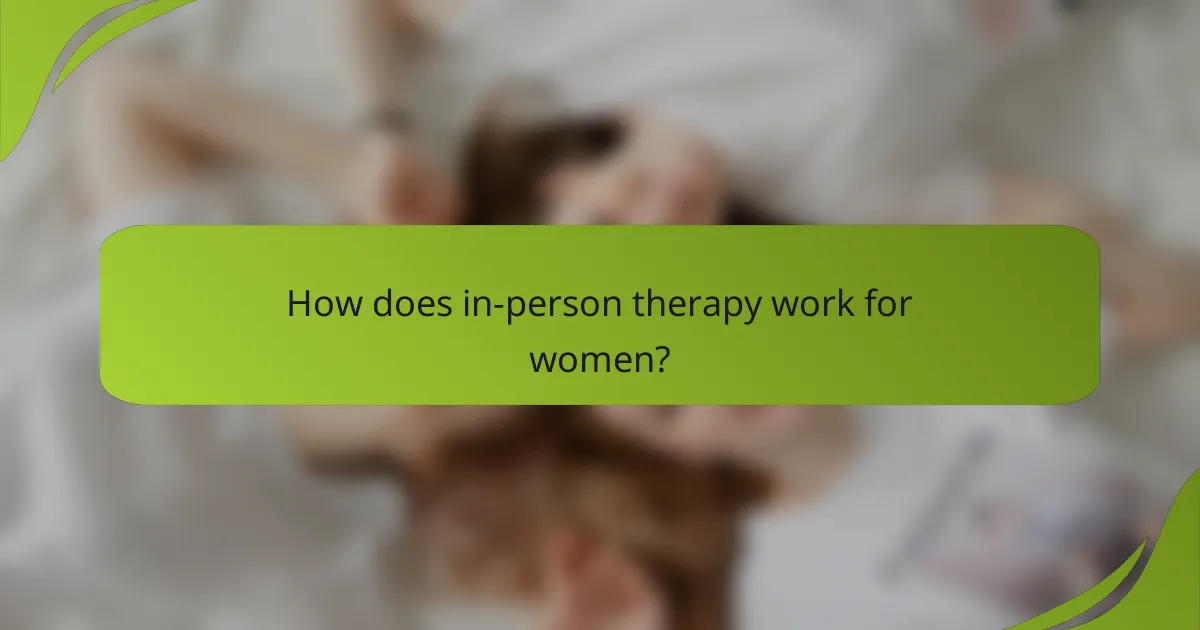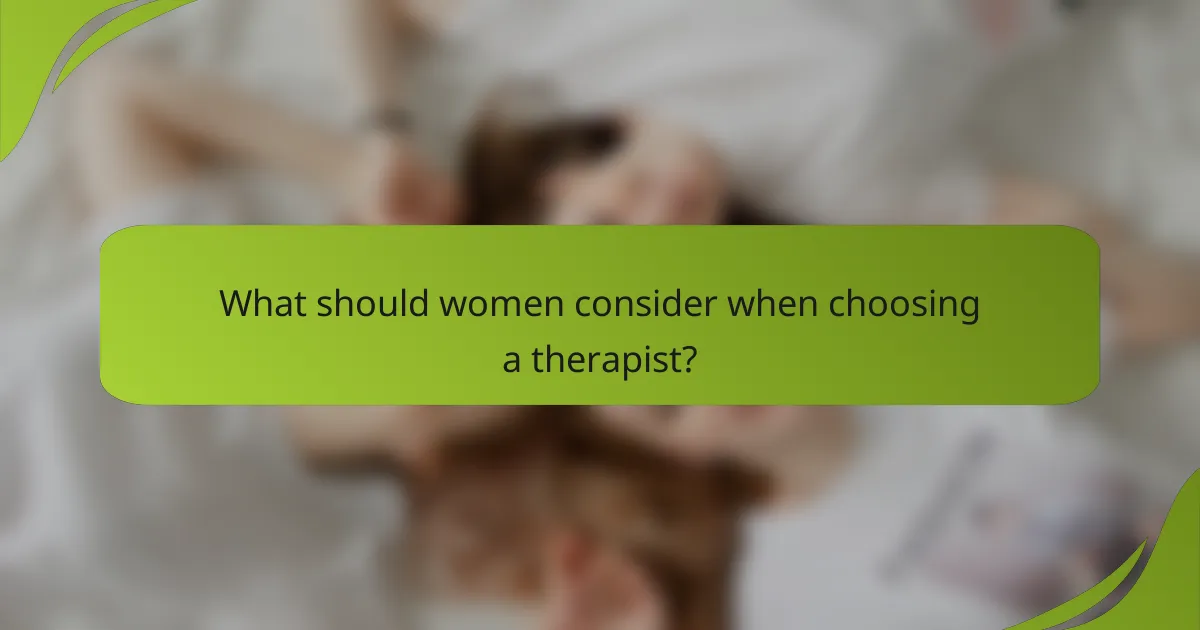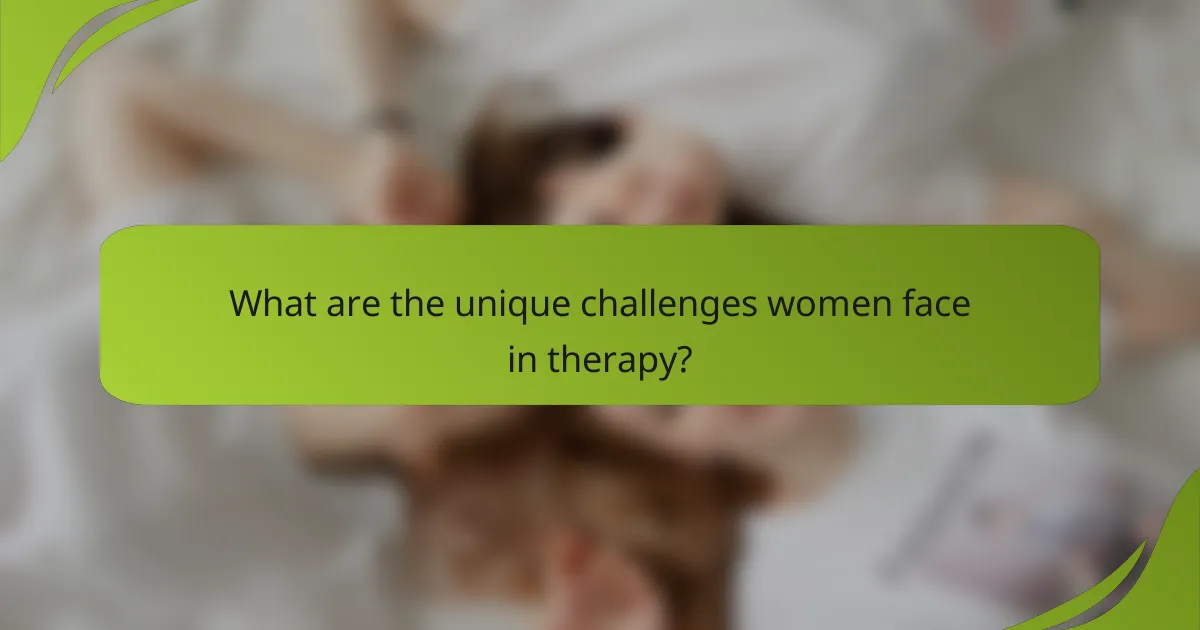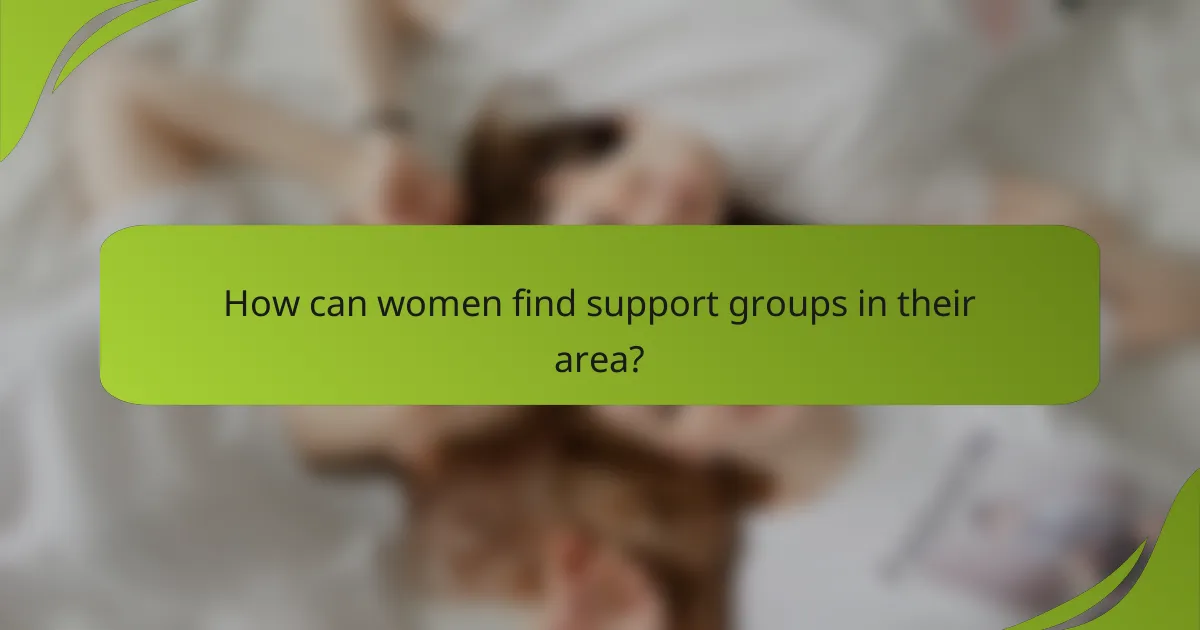Women seeking therapy have a variety of options to choose from, including in-person sessions and online counseling. Each approach offers distinct advantages, allowing for personalized experiences that cater to individual needs and lifestyles. Whether through face-to-face interactions or the convenience of virtual sessions, women can find effective support for their mental health and well-being.

What are the best therapy options for women in major US cities?
The best therapy options for women in major US cities include in-person sessions, online counseling, group therapy, and telehealth services. Each option offers unique benefits and considerations, allowing women to choose what best fits their needs and circumstances.
In-person therapy sessions
In-person therapy sessions involve face-to-face meetings with a licensed therapist. This traditional approach allows for a personal connection, which can enhance the therapeutic experience. Many women prefer this method for its direct interaction and the ability to read non-verbal cues.
When selecting an in-person therapist, consider their specialization, location, and availability. Sessions typically last 45 to 60 minutes and may range from $100 to $250 per visit, depending on the therapist’s experience and the city.
Online counseling platforms
Online counseling platforms provide therapy through video calls, chat, or messaging, making it accessible from anywhere. This option is particularly beneficial for women with busy schedules or those living in remote areas. It offers flexibility in choosing appointment times and can often be more affordable.
Popular platforms like BetterHelp and Talkspace allow users to connect with licensed therapists. Subscription costs can vary, generally ranging from $60 to $100 per week, depending on the services included.
Group therapy for women
Group therapy for women involves sessions with a therapist and a small group of participants, focusing on shared experiences and support. This format can foster a sense of community and reduce feelings of isolation. Women often find it empowering to share their stories and learn from others.
Group sessions typically meet weekly or bi-weekly and can cost between $25 to $75 per session. It’s essential to find a group that aligns with your specific needs, such as anxiety, depression, or trauma recovery.
Telehealth services
Telehealth services encompass a range of remote healthcare options, including therapy via phone or video. This approach has gained popularity due to its convenience and ability to reach individuals who may have mobility or transportation challenges. Many insurance providers now cover telehealth sessions, making them more accessible.
When using telehealth, ensure that your therapist is licensed in your state, as regulations vary. Sessions typically last the same duration as in-person visits and can cost similar rates, often between $100 and $200 per session, depending on the provider.

How does in-person therapy work for women?
In-person therapy for women involves face-to-face sessions with a licensed therapist in a private setting. This traditional approach allows for direct interaction, fostering a personal connection that can enhance the therapeutic experience.
One-on-one sessions with licensed therapists
In-person therapy typically consists of one-on-one sessions where women can discuss their thoughts and feelings openly with a trained professional. These sessions usually last between 45 to 60 minutes and are scheduled weekly or bi-weekly, depending on individual needs.
During these sessions, therapists utilize various techniques tailored to the client’s specific issues, such as cognitive-behavioral therapy (CBT) or psychodynamic therapy. This personalized approach helps address unique challenges women may face, including anxiety, depression, or relationship issues.
Benefits of face-to-face interaction
Face-to-face interaction in therapy offers several advantages, including the ability to read non-verbal cues and build a stronger rapport with the therapist. This personal connection can lead to a greater sense of trust and comfort, encouraging women to share more openly.
Additionally, in-person therapy can provide a structured environment free from distractions, allowing for deeper focus on personal issues. Many women find that the physical presence of a therapist helps them feel more supported and understood, which can be crucial for effective healing and growth.

What are the advantages of online counseling for women?
Online counseling offers women numerous advantages, including convenience, accessibility, and a wider range of options. This form of therapy allows women to connect with licensed professionals from the comfort of their homes, making it easier to prioritize mental health.
Accessibility from home
One of the key benefits of online counseling is the ability to access services from home. This eliminates travel time and the stress of commuting, which can be particularly beneficial for women with busy schedules or caregiving responsibilities. Women can engage in therapy sessions in a comfortable and familiar environment, enhancing their overall experience.
Additionally, online counseling can reach women in remote or underserved areas where mental health resources may be limited. This increased accessibility helps ensure that more women can receive the support they need, regardless of their location.
Flexible scheduling options
Online counseling typically offers flexible scheduling, allowing women to choose appointment times that fit their busy lives. Many platforms provide evening and weekend availability, catering to those who may work traditional hours or have other commitments. This flexibility can lead to higher attendance rates and better therapeutic outcomes.
Women can often reschedule or cancel appointments with ease, reducing the pressure to maintain a rigid therapy schedule. This adaptability can make it easier for women to prioritize their mental health without feeling overwhelmed.
Variety of platforms like BetterHelp and Talkspace
There are numerous online counseling platforms available, such as BetterHelp and Talkspace, each offering unique features and pricing structures. These platforms connect women with licensed therapists through video, phone, or messaging options, allowing for a personalized therapy experience. Women can choose the format that feels most comfortable for them.
When selecting a platform, it’s essential to consider factors such as cost, therapist availability, and the types of therapy offered. Many platforms provide free trials or introductory rates, enabling women to explore their options before committing long-term.

What should women consider when choosing a therapist?
Women should consider factors such as the therapist’s specialization, experience, and whether their services are covered by insurance. These elements can significantly impact the effectiveness of therapy and the overall experience.
Therapist’s specialization and experience
When selecting a therapist, it’s crucial to look for someone who specializes in areas relevant to your needs, such as anxiety, depression, or trauma. A therapist with specific expertise can provide tailored strategies and support.
Experience also matters; a therapist with several years in practice may have encountered a wider range of issues and developed effective techniques. Consider asking potential therapists about their backgrounds and approaches during initial consultations.
Insurance coverage and costs
Understanding insurance coverage is essential when choosing a therapist. Check if your health plan includes mental health services and what percentage of costs they will cover. Some plans may require referrals or have specific networks of providers.
If you are paying out-of-pocket, therapy costs can vary widely, typically ranging from $50 to $250 per session. It’s advisable to discuss fees upfront and inquire about sliding scale options if affordability is a concern.

What are the unique challenges women face in therapy?
Women often encounter specific challenges in therapy, including societal expectations, gender-based discrimination, and unique mental health issues. These factors can influence their willingness to seek help and their experiences during therapy sessions.
Gender-specific mental health issues
Women may experience mental health issues that are influenced by hormonal changes, reproductive health, and societal pressures. Conditions such as anxiety, depression, and eating disorders are frequently reported among women, often exacerbated by life events like pregnancy, motherhood, or menopause.
Therapists should be aware of these gender-specific issues to provide tailored support. For instance, women may benefit from therapy that addresses self-esteem and body image, especially in cultures that emphasize unrealistic beauty standards.
Balancing therapy with family and work
Many women juggle multiple responsibilities, making it challenging to prioritize therapy. The demands of family and work can lead to feelings of guilt or inadequacy when taking time for self-care, including attending therapy sessions.
To manage this balance, women can consider flexible therapy options, such as online counseling or evening appointments. Setting clear boundaries and scheduling regular sessions can help ensure that therapy remains a priority amidst other commitments.

How can women find support groups in their area?
Women can find support groups in their area by utilizing local resources such as community centers, healthcare providers, and online platforms. Many organizations offer directories or listings of support groups tailored to women’s needs.
Online Resources for Finding Support Groups
Online platforms like Meetup, Facebook Groups, and specialized websites can help women locate support groups nearby. These resources often allow users to filter by interests, location, and group type, making it easier to find a suitable match.
Additionally, websites like Psychology Today provide directories of therapists and support groups, allowing women to search based on specific issues such as anxiety, depression, or parenting challenges. Many of these listings include contact information and group schedules.
Local Community Centers and Organizations
Community centers often host support groups for women, covering various topics such as mental health, parenting, and relationship issues. Checking with local health departments or women’s organizations can reveal additional resources.
Nonprofits focused on women’s health and wellness frequently offer support groups. These organizations may provide free or low-cost options, making them accessible to a wider audience.
Healthcare Providers and Therapists
Healthcare providers, including primary care physicians and mental health professionals, can recommend local support groups. They often have connections with community resources and can guide women to appropriate options based on their needs.
Therapists may also facilitate support groups themselves or know of others in the area. Women seeking therapy can inquire about group options during their initial consultations.


